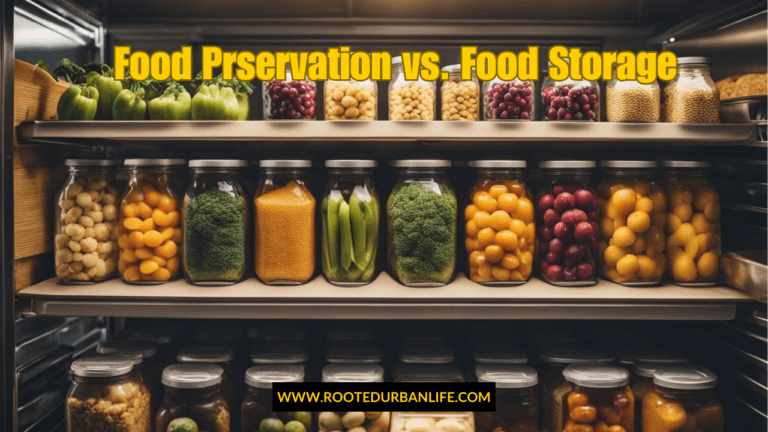Health Benefits of Fermented Foods: Enhancing Digestion and Boosting Immunity
Fermented foods have been a part of diets around the world for centuries. They are not just tasty; they also pack a punch when it comes to health benefits.
Incorporating these foods into your diet can improve your digestive health, boost your immune system, and even support your mental well-being.
Read more: Health Benefits of Fermented Foods: Enhancing Digestion and Boosting ImmunityYou may be surprised to learn how easy it is to include fermented foods in your meals. From yogurt to kimchi, these tasty options can enhance both your meals and your health.
The process of fermentation helps to develop beneficial bacteria that can support your body in various ways.
| Fermented foods, such as yogurt, kimchi, and sauerkraut, offer numerous health benefits, including improved digestion, enhanced immune function, and better mental well-being. This article explores the science behind fermentation, its historical significance, and practical tips for incorporating these nutrient-rich foods into your diet for a healthier lifestyle. |
Understanding Fermentation
Fermentation is a process used for thousands of years to preserve and transform foods. It involves the action of microorganisms that break down sugars to produce acids, gases, or alcohol.
This section explores its historical significance and the basic principles behind fermentation.
Historical Significance
Fermentation has a rich history across many cultures. It began about 7,000 years ago, helping people preserve food before refrigeration.
- Ancient Practices: Different societies used fermentation. For example, the Chinese made fermented rice, while the Egyptians brewed beer.
- Cultural Importance: Fermented foods became part of traditional diets around the world. They not only preserved food but also added unique flavors.
- Health Benefits: People noted the health benefits, such as improved digestion and longer shelf-life. This led to the development of various fermented foods we enjoy today.
Basic Principles of Fermentation
Fermentation relies on microorganisms like bacteria, yeast, and molds. These tiny organisms convert sugars into other substances.
- Anaerobic Process: Fermentation often occurs in environments with little to no oxygen. This is crucial for both yeast and some bacteria.
- Types: Two main types are lactic acid fermentation and alcoholic fermentation. Lactic acid fermentation is key in making yogurt and sauerkraut. Alcoholic fermentation is used in brewing and baking.
- End Products: The process produces different substances, such as acids, gases, and alcohol. For example, lactic acid gives yogurt its tangy flavor.
Nutritional Profile of Fermented Foods
Fermented foods offer a rich blend of essential nutrients. These foods are not just tasty; they also provide vitamins, minerals, and beneficial bacteria that support health. Understanding their nutritional profile can help you make informed choices.
Vitamins and Minerals
Fermented foods are good sources of various vitamins and minerals. For example, yogurt and kefir contain vitamin B12, which is important for nerve health and the formation of red blood cells.
Other fermented foods like sauerkraut and kimchi are high in vitamin K, which supports bone health. Additionally, fermented foods provide minerals such as calcium, magnesium, and iron, which are vital for overall body function.
Here’s a quick list of nutrients found in some common fermented foods:
- Yogurt: Vitamin B12, calcium
- Kefir: Vitamin B12, magnesium
- Sauerkraut: Vitamin K, iron
- Kimchi: Vitamin A, calcium
Probiotics and Their Role
Probiotics are live bacteria found in fermented foods. These beneficial microbes can improve gut health by maintaining a healthy balance of gut flora. A balanced gut can lead to better digestion and may help prevent various digestive issues.
Regularly consuming probiotics may also boost your immune system. They can help your body fight off illness by enhancing your natural defenses. Many fermented foods, like kombucha and miso, are rich in these good bacteria.
Here are some common probiotics and the foods they are found in:
- Lactobacillus: Yogurt, kefir
- Bifidobacterium: Yogurt, fermented vegetables
- Saccharomyces: Kombucha, beer

Digestive Health Benefits
Fermented foods offer a range of digestive health benefits. They help balance gut bacteria and improve how your body breaks down food. Here’s a closer look at these advantages.
Enhancing Gut Flora
Your gut contains trillions of bacteria. Some are good, and some can be harmful. Fermented foods are rich in probiotics, which are live bacteria that promote good health.
Eating foods like yogurt, sauerkraut, and kimchi introduces beneficial bacteria to your gut. This helps keep harmful bacteria in check. A healthy gut flora can reduce issues like bloating and gas. It can also lower your risk of digestive disorders.
To boost your gut flora, try adding a variety of fermented foods to your meals. The more diverse the bacteria, the better your digestive health can be.
Improving Digestion and Absorption
Fermented foods can make digestion easier. The fermentation process breaks down food, making nutrients more accessible. This is particularly helpful for those with lactose intolerance.
For example, yogurt contains lactose that is already broken down, making it easier for you to digest. This means your body can absorb protein, vitamins, and minerals more effectively.
Additionally, the probiotics in fermented foods may support the lining of your intestines. This can improve nutrient absorption and enhance overall digestive efficiency. Eating these foods regularly could lead to smoother digestion and better health.
Immune System Support
Fermented foods can play an important role in supporting your immune system. They can help strengthen your body’s defenses and reduce inflammation, which is key to staying healthy.
Strengthening Immune Defence
Fermented foods are rich in probiotics, which are beneficial bacteria. These probiotics can enhance your gut health. Most of your immune system is located in your gut, so a healthy gut can lead to better immune function.
Consuming foods like yogurt, kimchi, and sauerkraut can increase the number of healthy bacteria in your digestive system. This helps your body fight off harmful bacteria and viruses.
Adding these foods to your diet might improve your body’s ability to respond to infections.
A strong immune system can also help you recover more quickly when you do get sick. Eating a variety of fermented foods ensures you get diverse probiotics. This variety can further support your immune defences.
Reducing Inflammation
Chronic inflammation can weaken your immune system and lead to various health issues. Fermented foods can help reduce this inflammation. The probiotics found in these foods may produce compounds that act as natural anti-inflammatories.
For example, foods like kefir and kombucha contain strains of bacteria that fight inflammation. They can help balance your immune responses. This balance is important to avoid overreacting to infections or allergens.
Incorporating fermented foods into your meals can help lower markers of inflammation in your body. Try adding them to salads, smoothies, or snacks. They can be delicious and beneficial additions to your diet that support your immune health.
Mental Health and Mood Regulation
Fermented foods can impact your mental well-being in significant ways. They help support the connection between your gut and brain, as well as aid in reducing stress and anxiety.
Gut-Brain Axis
The gut-brain axis is a two-way communication system between your gut and brain. Fermented foods, like yogurt and kimchi, contain probiotics that promote good bacteria in your gut.
These beneficial bacteria can help produce neurotransmitters like serotonin, which is important for mood regulation. By eating more fermented foods, you may improve your gut health, which can lead to better mental clarity and mood stability. Including sources of probiotics can help strengthen this connection.
Stress and Anxiety Reduction
Fermented foods can also play a role in lowering stress and anxiety over time. Foods such as kefir and sauerkraut can influence your body’s response to stress.
Probiotics in these foods have shown potential benefits for reducing levels of cortisol, a stress hormone. Lower cortisol levels can help you feel calmer and more balanced. This might also lead to a reduction in symptoms of anxiety, supporting your overall mental health.
Frequently Asked Questions
You may have questions about the health benefits of fermented foods. This section answers common inquiries about their advantages, risks, and role in a healthy diet.
What are the known health advantages of consuming fermented foods regularly?
Fermented foods can improve gut health by adding beneficial bacteria to your digestive system. They may also boost your immune system and enhance nutrient absorption. Some studies suggest they can even improve mental health.
Are there any specific health conditions that could be exacerbated by eating fermented foods?
Certain health conditions, like histamine intolerance or yeast allergies, can worsen with fermented foods. People with compromised immune systems should also be cautious. It is best to consult a healthcare provider if you have concerns.
Which fermented foods are considered the healthiest to include in one’s diet?
Some of the healthiest fermented foods include yogurt, kefir, sauerkraut, kimchi, and kombucha. These foods are packed with probiotics and essential nutrients. Choosing a variety can maximize health benefits.
How does the regular consumption of fermented foods impact digestive health?
Fermented foods help balance gut bacteria, which supports digestion. They can alleviate symptoms of bloating and gas. Regular intake may also reduce the risk of digestive disorders.
Can fermented foods play a role in managing inflammation in the body?
Fermented foods may help lower inflammation levels due to their probiotic content. Probiotics can support a healthy response to inflammation. Some studies indicate better inflammation markers with regular consumption.
What are the potential risks associated with the overconsumption of fermented foods?
Eating too many fermented foods could lead to digestive issues like bloating or diarrhea.
Overconsumption may also result in an excess of certain nutrients, leading to imbalances.
Key Takeaways
| Fermented foods are packed with essential vitamins, minerals, and probiotics that support overall health. Regular consumption of fermented foods can improve gut flora, enhance digestion, and alleviate issues like bloating and gas. The probiotics found in fermented foods help strengthen the immune system, making the body more resilient against infections. There is a strong connection between gut health and mental health, with fermented foods potentially improving mood and reducing anxiety. Adding fermented foods like yogurt, kefir, kimchi, and sauerkraut to your meals is simple and can enhance flavor while boosting health benefits. |
Incorporating fermented foods into your diet can significantly enhance your overall health, offering benefits like improved digestion, stronger immunity, and better mental well-being. With a variety of delicious options available, from yogurt to kimchi, there’s something for everyone to enjoy.
Ready to experience the health benefits of fermented foods? Start adding these tasty options to your meals today! Share your favorite fermented recipes or tips in the comments below, and don’t forget to follow our blog for more health and wellness insights!








